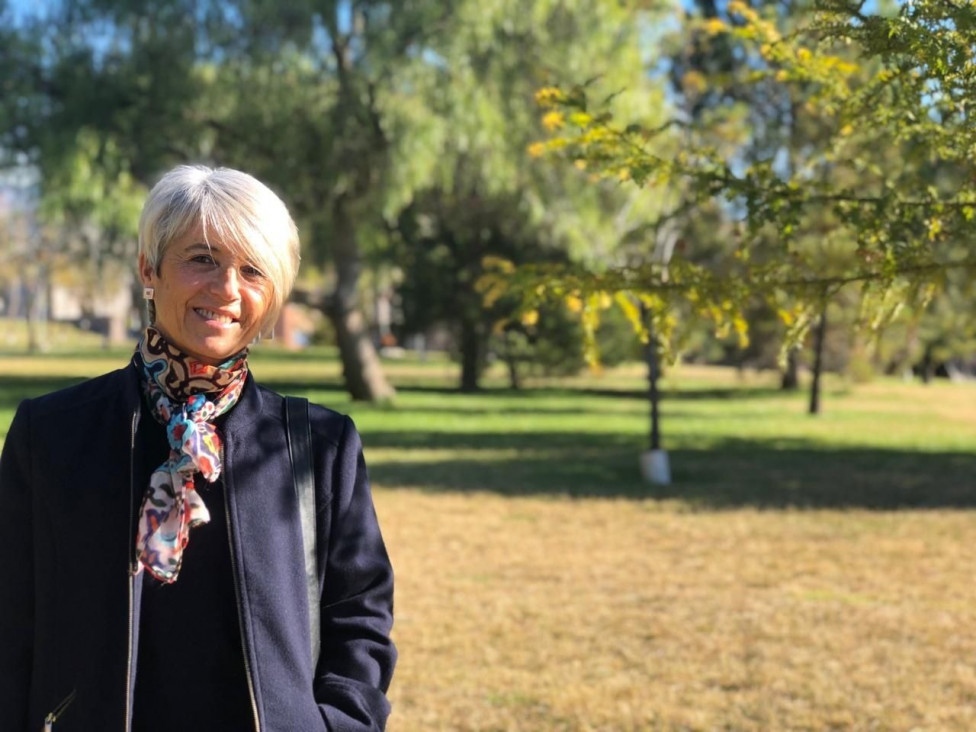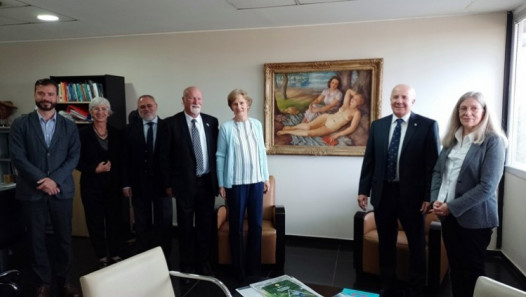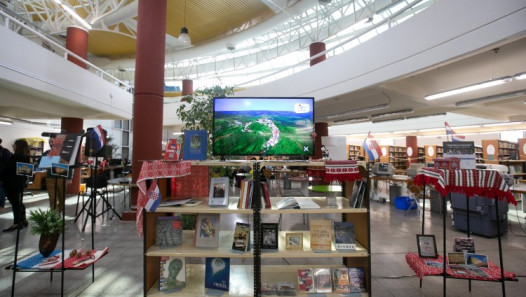Gabriela Pastor’s tone put her in the spot. She is an architect graduated from Buenos Aires and her career took her to Tucumán, and finally to Mendoza. Although she wasn’t born in Mendoza, her heart has some stains of Malbec and the UNCuyo is a pillar in her research and teaching career.
Her scientific passport has more stamps on it than the Argentine post office, and she is the living example of the result of the international nets and the effort to carry on a research Project. A word which could identify her might be “internationalization”, expression which encloses endless possibilities. If we talk about internationalization we are not talking about travelling just for travelling or business travel, we are talking about transferring knowledge to create a new one, to create nets or multicultural teamwork.
She is currently a teacher of the Chair “Landscape Design” from the Faculty of Engineering and UNCuyo researcher –CONICET. Pastor completes the academic triangle by bonding all of her work to the outreach and transporting her students to shots which allow them to put their knowledge at the service of society.
“There is science which creates concrete tools for the society like sustainable buildings, and there is science which creates the necessary knowledge to mold decision making; both of them are necessary, and both of them change the world.”
Creating nets
Spain was one of her first starting points. She got her PhD at the University of Sevilla, and against all of her predictions, she decided to come back to Argentina since she had pursued her only dream: to start working at the CONICET.
In Europe, she started the bonds to obtain the first ERASMUS +Project from the UNCuyo. Under the name “TELL ME” which involves a consortium of 10 international institutions which one of them is the UNCuyo. Pastor and her team received European funding for their research.
An ERASMUS + isn’t a minor thing, being part of one implies receiving funding from the European Commission for projects which are considered to have a global impact. Researchers who are part of it become distinguished figures on the international academic community, therefore, are extremely required. With “TELL ME”, Gabriela put Mendoza and the UNCuyo inside the ERASMUS net for the first time. With her research, Gabriela prepared the ground for the university to have 7 projects of this kind. However, the path wasn’t easy, and there are several requirements to obtain international fees and it is hard to coordinate experts from all over the world. In her first attempt, the project was not accepted but, stumbling is not falling, and the conviction of one group of scientists was stronger. Finally, in her second attempt, TELL ME was approved by the European Union.
TELL ME is currently studying the foothills of Mendoza and the human creation of the landscape, in a context in which the construction in such territory is not allowed until the studies allow clarifying what kind of development is more appropriate.
The idea of getting involved in this universal journey came up in 2016 thanks to a scholarship of Teaching Mobility. Gabriela applied so as to fulfil a stay at the Politecnico di Milano (Italy) (referent institution at an international level in the field of design and architecture), and she won a scholarship to fulfil this stay. The purpose of this mobility was to elaborate a joint project which got stronger with a new mobility fulfilled through AUIP (UNCuyo is part of this association) to Sevilla.
The Research Project coordinated by the POLIMI, counts on the collaboration of Slovenian, Mexican, Argentine, Spanish and Italian institutions, which converge in several meetings around the world. As a matter of fact, Mendoza will host such institutions next semester. The face-to-face meetings are only a way of communication since the new technologies also allow the generation of webinars or group video calls which allow contact despite the distance.
“Mobility Programs allow people to win and generate academic resources. You get to know people who are interested and inspired by the same topics but from different points of view.
As regards funding, Gabriela highlights that money must be obtained from different sources and it is a job which is part of the scientific career. Alliances with organizations from public or private sector, liaisons with other educational institutions and international nets are the pillars which work in synergy when it comes to create science.
Science and languages
Foreign languages are part of an equation that includes science, papers, and team work, with members from different nationalities. Studying English becomes urgent when it is established as an official language of an ERASMUS student. With this in mind, in 2018, Gabriela won a scholarship of the UNCuyo Teaching Exchange Program to strengthen her knowledge regarding the English language (by training in countries where such language is spoken). The original destination was New Zealand but some changes in her life made her fulfill her stay at Liverpool, England, where she was able to study there for three weeks. For three intense weeks, she lived with a British family who allowed her to expand even more her horizons, together with her mates who vary from Kuwait to France and Brazil.
“Reading and understanding the English language is necessary for any researcher since is the official language of the papers at a world level. If oral skills are added, then we are talking about the possibility of establishing direct dialogues with researchers from other countries without the need of intermediaries.”
Gabriela enrolled in an intensive training which allowed her to fully concentrate on the English practice and learning and activities which included culture and gastronomy outside the classes managed by the same language institute.
It is no surprise that her family follows the same path: two sons with university exchanges in Brazil and Colombia, and her husband with professional experience in France. Honoring her last name, Pastor (“shepherd” in English) is in charge of guiding her colleges, students, and family to a global community which demands the development of international competences.
“Thanks to this mobility I was able to articulate and synergize the resources we have. The profit of speaking English is boundless, I keep on studying in Mendoza but the stay at Liverpool was fundamental. “
About the Mobility Program
The UNCuyo Mobility Program for teachers opens its call once a year and it is only for professors from the UNCuyo. Through this program, financial aids are granted to professors so that they can fulfil their stay of training abroad.
. The minimum requirement to apply is to teach at the UNCuyo for at least two years. Those who are interested in applying can find all the information at www.uncuyo.edu.ar/relacionesinternacionales


